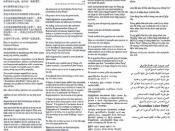The law can be tricky business, and labor laws are no exception. Complying with federal regulations does not necessarily mean you are complying with those instituted at the state level, nor vice versa. Most states default to the federal wage and hour regulations, but several states have their own set of provisions. When state regulations differ from The Fair Labor Standards Act (FLSA) regulations, employers must comply with whichever law is more generous to the employee. Although minimum federal standards must be met and enforced, states are capable of making their own legal requirements as they see fit. The main requirement is that these more stringent laws must be deemed constitutional to the residents of that state. In the following paper, we will discuss the impact of Federal and State labor laws, as well as reviewing an example of a state law known as the Texas Payday Law.
Federal Labor LawsFederal labor laws typically deal with employer-union relationships and Federal employment laws typically deal with employer-employee relationships.
The terms are used interchangeably, with labor laws as the most common usage. Laws are also called statutes and regulations enforce them. The Department of Labor (DOL) enforces over 180 employment and labor laws. It also provides the resources to research employment and labor laws, such as those for, overtime, child labor, minimum wage, and family and medical leave (Federal Labor Law).
Acts of congress establish Federal labor laws. Acts that are not Federal labor laws per se, but that do have provisions related to some aspect of employment, are also included. States are permitted to enact and enforce their own employment and labor laws, which include or expand the minimum protections afforded by the Federal laws. The Fair Labor Standards Act of 1938(FLSA) is a landmark act where Federal labor law...


